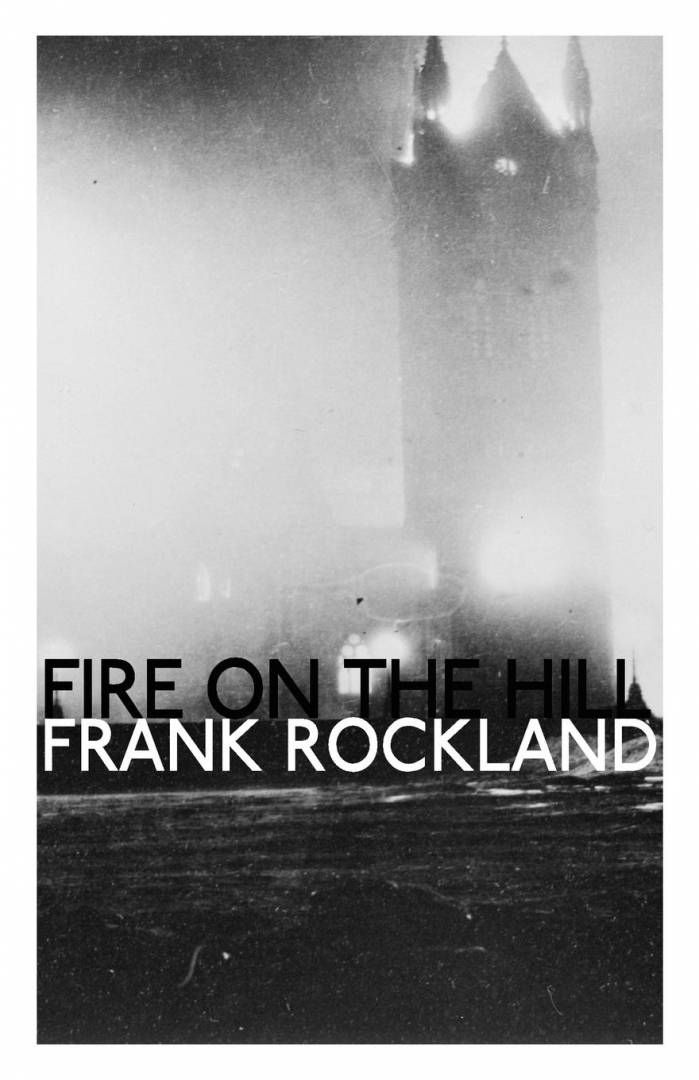
Fire on the Hill: A Canadian historical suspense novel by Frank Rockland
Discover what really happened on the night of February 3, 1916, when a suspicious fire destroyed the centre block of the Canadian Parliament Buildings.
On tours of the Center Block of the Parliament buildings, guides explain that the previous building was destroyed by a fire on the night of February 3, 1916.
When asked what started the fire, they may tell you that a carelessly lit cigar in the Reading Room sparked the conflagration. They might mention in passing that German agents or sympathizers could have set the fire.
This suspicion is the starting point of local writer Frank Rockland’s novel Fire on the Hill. What if German agents were involved in destroying most of Canada’s original Parliament Buildings? After all, Canada was at war with Germany. While Canada’s reputation as a feared fighting force was still years away, Canada was still essential for the Allied war effort, providing the “muscles of war” such as iron ore for the arms factories and wheat from the prairie breadbasket to feed the millions of Allied soldiers in Europe.
These suspicions are not as far-fetched as they might sound. Driving forces behind these suspicions were the Fenian Raids into Canada in the 1860s, which were still vivid in many Canadians’ memories. Several leading figures had actually fought in the raids: Sam Hughes, Minister of Militia and Defence, and Sir Wilfrid Laurier served during the Fenian raids.
The fear of raids by German reservists was so great that Prime Minister Sir Robert Borden authorized $100,000 in funding to the Dominion Police’s Secret Service for counter-intelligence work. Everyone on the home front was looking for German spies.
The actual cause of the fire was never discovered. The Royal Commission appointed to investigate the origin of the fire concluded:
The fire started in a pile of papers on a shelf on one of the reading tables near the House of Commons. The first person to see the fire was Francis Glass, ESQ., M.P., who stated that the fire originated while he was in the reading-room: that he had been in the reading-room a short time when he felt a wave of heat passing up alongside of him from a hot-air register, and he turned around and almost immediately smelled the burning of paper; stooped down and saw smoke coming out.
As to the question of whether the fire was deliberately set, the report made the following conclusions:
Your commissioners are of the opinion that there are many circumstances connected with this fire that lead to a strong suspicion of incendiarism, especially in view of the fact that the evidence is clear that no one was smoking in the reading-room for some time previous to the outbreak of fire, and also to the fact that the fire could not have occurred from defective electric wiring. But while your commissioners are of such opinion, there is nothing in the evidence to justify your commissioners in finding the fire was maliciously set.
Your commissioners feel very strongly that it might be possible at a later date to obtain evidence (which they cannot reach at the present time) which might establish beyond question whether this fire was incendiary or accidental, and with the approval of Your Royal Highness, your commissioners would humbly suggest that this report be treated not as a final report but as an interim report, and that the commission be left open, and in the event of your commissioners being able to get further evidence at a later date, that they be permitted to do so.
The Plot
What really happened that fateful night when a fire destroyed the Centre Block of the Parliament Buildings in Ottawa?
Inspector Andrew MacNutt, his wife Katherine, and Count Jaggi know as they were there in the Centre Block’s reading-room when the fire started.
Ever since the war began, Inspector MacNutt, head of the Dominion Police’s Secret Police, has been struggling to secure the Canadian and US border against acts of sabotage by a network of saboteurs being run by German military diplomatic attachés Captain Franz von Papen and Captain Karl Boy-Ed out of New York City.
Inspector MacNutt’s job is not easy as he tries to get a grip on authorized and unauthorized counter-intelligence operations being run by various government departments, busybodies such as the wealthy and influential Mrs. Wayne Ramsey, gripped with spy fever and an overactive imagination, reporting anyone with a German-sounding name as a spy, and being informed of British counter-intelligence activities in New York City by the American newspapers.
The good news is that the military attaché’s activities had caught the attention of the American authorities, especially Inspector Thomas Tunney of the New York City Police Department’s Bomb Squad. They declared von Papen persona non grata and ordered him back to Germany. As for the bad news: German military intelligence had sent one of their best operatives in England, Count Jaggi, to replace him with orders to hamper and disrupt Allied shipping out of New York City’s harbour.
Before going to New York, Count Jaggi visits Ottawa to get the lay of the land. Ottawa was the key transit point for British gold shipments to pay for munitions contracts in Canada and the United States.
Count Jaggi’s title and his cover as a Belgian Relief representative give him quick entry to the highest levels of Ottawa society, where he meets Conservative Prime Minister Sir Robert Borden and future Liberal Prime Ministers Sir Wilfred Laurier and Mackenzie King, as well as the Governor-General, his Royal Highness the Duke of Connaught.
In Ottawa, Count Jaggi, a womanizer with a weakness for married women, meets a very attractive Katherine MacNutt, the Inspector’s wife, who is helping with the homefront war effort by working on Ottawa’s Belgian Relief committee. Their first meeting was not very auspicious since she gave him a white feather while he was mailing reports, written in invisible ink back to Germany. Handing out white feathers was a common practice by Canadian women to encourage young men to enlist. Katherine starting handing out the white feathers when her son, Jaime, was reported missing in action in France.
When Count Jaggi arrives in New York, he and Hans Müller, his second-in-command, try to clean up the mess created by the British confiscation of von Papen’s personal and diplomatic papers, which detailed his intelligence activities, when his ship was stopped in the Port of Falmouth, England.
However, Inspector Tunney is hot on the trail of German saboteurs who have been targeting Allied shipping in New York City harbour and soon will have the Count in his sights.
As Count Jaggi takes a final trip to Ottawa to give his Belgian Relief lecture, he doesn’t know that Inspector MacNutt has intercepted his secret letters, written in invisible ink, and is waiting for him.
But the Count couldn’t resist seeing Katherine one last time with tragic consequences.
For more information about Fire on the Hill, contact Sambiase Books at www.sambiasebooks.ca
______________________________
Frank Rockland is a pen name for an Ottawa-based writer. Born in Italy, he moved to Canada when he was one year old. He is currently employed as a civil servant with the federal government. When he attended Carleton University, he spent a summer as a tour guide on Parliament Hill where he got the idea of writing the suspense novel Fire on the Hill. Between May and September, Frank Rockland spends his time vainly trying to lower his golf handicap.
All images: Library and Archives Canada: Library and Archives Canada

















